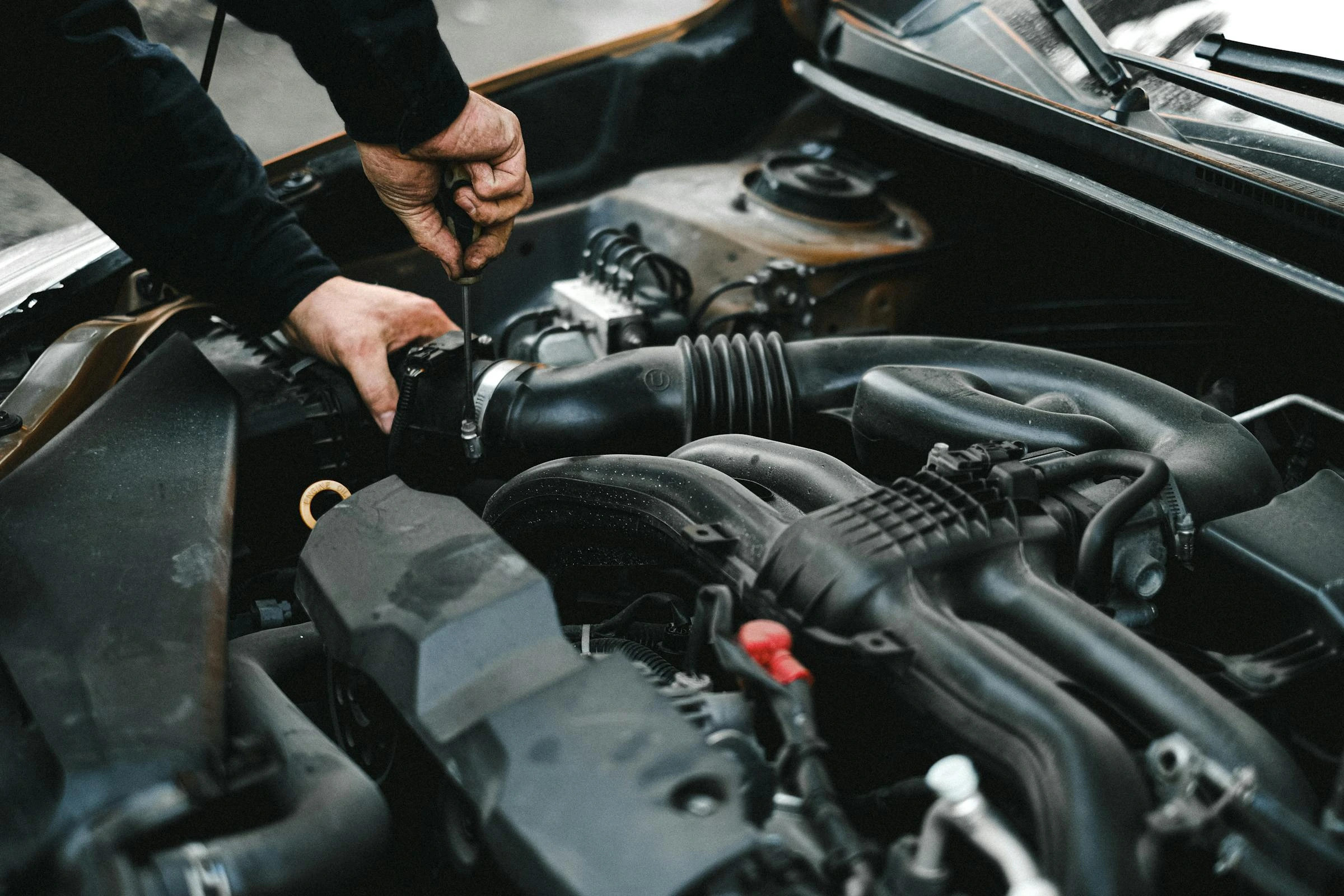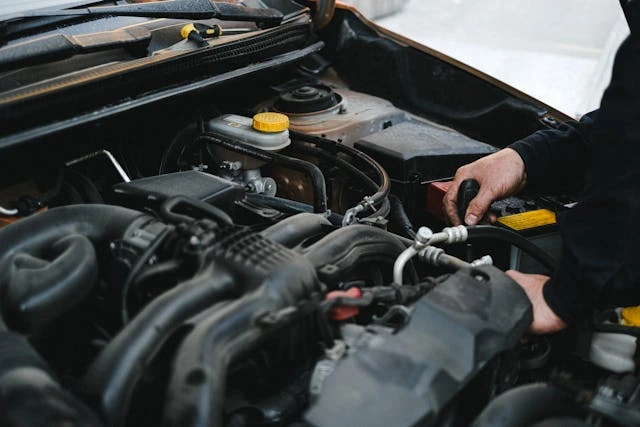Why a Clogged Oil Filter Spells Trouble for Your Car
05 Jan 2026

Clean oil, which is the lifeblood of a combustion engine, is integral to the smooth running of your car. Contaminants, dust particles, and dirt can quickly accumulate in engine oil and compromise its function unless removed by your oil filter. This is why a clogged oil filter can quickly cause issues for your vehicle, as it’s unable to remove harmful debris. Here, we cover the symptoms of a dirty oil filter, and exactly what consequences that might have for your car.
What Does an Oil Filter Do?
An oil filter is responsible for keeping your engine oil clean as it circulates; it’s recommended to replace filters at every oil change. Impurities, metal particles, dust, and debris that have the potential to damage internal engine components if left in the oil are caught by the filter. Removing these contaminants helps oil to optimally lubricate the engine’s moving parts, reduces friction, and prevents avoidable wear and tear.
Checking oil levels, topping up, and changing oil and filters when signs of degradation become apparent are fundamental car care tips. This is due to the potentially serious repercussions of dirty or low engine oil levels. Breakdown specialists The AA reported engine oil issues as one of the top ten causes of vehicle breakdown, highlighting the importance of a functional oil filter.
What Are the Symptoms of a Clogged Oil Filter?
There are a few signs that can point to a clogged oil filter. If you’ve ever asked yourself how to tell when it’s blocked, here’s what to keep an eye on. Being vigilant for any of these signs will allow you to resolve the problem promptly, avoiding serious damage to your vehicle:
- Oil Pressure Warning Light Switches On: A clogged oil filter will inhibit flow, causing oil pressure to drop and triggering the warning light on the dashboard.
- Knocking, Rattling, or Metallic Grinding Sounds: The reduced flow of clean oil prevents proper lubrication from reaching the moving parts of the engine. The metal-on-metal contact this causes can result in these noises emanating from under the car’s bonnet, signifying an urgent need for attention.
- Dirty, Degraded Oil: When you check your oil with the dipstick, if it looks thick, dark, dirty, or sludgy, and it has been changed fairly recently, this is a clear sign that oil isn’t being filtered efficiently.
- Reduced Engine Performance: A sluggish engine, lower acceleration, drops in power, and stalling can all be the result of a clogged oil filter. These symptoms might be especially apparent when driving uphill or under a heavier load.
- Engine Overheating: Overheating can occur if oil circulation is restricted, though other issues like coolant leaks or radiator problems may also be the cause.
- Dark Exhaust Fumes: This is usually related to fuel or combustion issues. However, poor oil quality due to inadequate filtration may contribute under certain conditions

Beyond the warning signs of a dirty oil filter, driving with one that’s clogged can lead to several problems under the bonnet. Here's what it can do to your vehicle:
What Happens if an Oil Filter is Clogged?
A clogged oil filter inhibits the flow of oil within your car’s engine, causing many problems, such as:
- Consequences of Reduced Oil Flow: Restricted flow of oil starves engine parts of essential lubrication. This increases: friction between moving parts, heat build-up, and wear-and-tear, potentially resulting in severe damage to components. Reduced oil flow can also trigger the bypass valve to be used, circulating dirty, degraded oil throughout the engine to prevent total oil starvation.
- Poor Performance: Your engine will begin to struggle without adequate, clean oil, reducing power, causing stalling and rough idling. Fuel economy will also be compromised as the engine load increases to compensate for the lack of proper lubrication. Can a clogged filter cause a car not to start? In extreme cases where engine damage has occurred due to prolonged oil starvation, yes, starting issues may result.
- Overheating: Insufficient oil flow means that heat generated by the engine cannot be dissipated properly, and excess friction only causes more heat build-up. This increase in engine temperature can quickly cause overheating, a leading cause of engine failure.
- Increased Wear on Engine Components: Besides the wear and tear that engine parts experience due to inadequate lubrication, contaminants in improperly filtered oil can also cause damage. Scratching and scoring from abrasive particles will cause internal parts like pistons, cylinder walls, and bearings to deteriorate over time. Repairing these is a complex and costly process.
- Drop in Oil Pressure: When engine oil cannot circulate efficiently, it causes a drop in pressure within the engine, triggering the dashboard warning light to come on. Low oil pressure means that moving parts won’t be properly lubricated, potentially causing the engine to seize up and fail.
What Will Happen if an Oil Filter Becomes Completely Blocked?
In case you were thinking, ‘Can I drive with a clogged oil filter?’, it is worth considering these potential consequences. Continuing to operate your vehicle with a blocked oil filter long-term can result in:
- Component Damage: Resulting from both insufficient lubrication and increased friction, the metal-on-metal contact a blocked oil filter causes will quickly damage moving components.
- Overheating: Poor oil circulation and quality create excessive heat build-up, allowing the engine to overheat.
- Total Engine Failure: Too much heat, friction, and damage to engine parts will ultimately result in total engine failure and the vehicle breaking down. This may require a full replacement of the engine to resolve.
Avoiding all these problems is thankfully simple if you follow these basic car care guidelines:
How to Prevent Clogged Oil Filter Issues?
Using quality parts and observing fundamental maintenance practices will help prevent any dirty oil filter issues:
- Follow the Recommended Maintenance Schedule: Sticking to the schedule recommended by your vehicle’s manufacturer for your car and the conditions it is operated in is essential. This will include servicing, oil change, and filter change intervals- typically every 5,000-10,000km. Look for signs of an oil change being needed in between services, too, to ensure your engine can function optimally.
- Use High-Quality Engine Oil and Oil Filters: Cheap oil will degrade faster, creating a build-up of debris that needs filtering out. Cheap oil filters are likely to clog up faster and may not filter the oil as efficiently. Investing in high-quality products is the best way to be assured of excellent performance long term.
- Heed Warning Signs: If you notice any of the symptoms of a dirty oil filter listed above, get your car checked by a professional mechanic as soon as possible. Promptly addressing signs like knocking sounds, the oil pressure warning light triggering, or increased heat within the engine is imperative to safeguard your vehicle from serious damage.
While a clogged oil filter might seem trivial, the consequences for your car can lead to significant engine wear or damage if left unresolved. Thankfully, it is very straightforward to avoid any issues or costly repairs. Just replacing your oil filter regularly keeps engine oil flowing cleanly and freely. This allows your vehicle to keep functioning at its best, year after year.
For advice on extending the lifespan of your car, or some assistance changing your oil filter, visit your nearest Gulf Express Centre.

